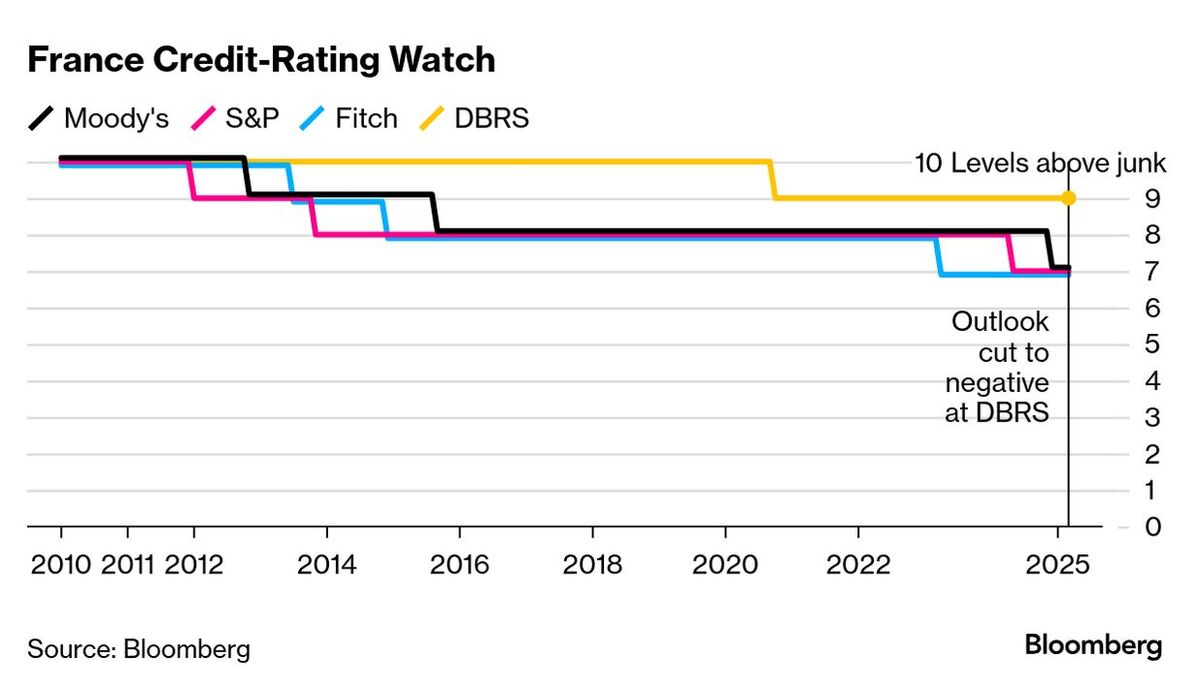France's Credit Rating Cut: A Budgetary Warning Sign?
Editor’s Note: France's credit rating has been downgraded. This article analyzes the implications of this significant economic event.
Why This Matters: France's Economic Outlook and Global Implications
France, a major player in the global economy, recently faced a credit rating downgrade, sending ripples through financial markets. This isn't just a French issue; it highlights growing concerns about government debt and spending across Europe and beyond. Understanding the reasons behind the downgrade and its potential consequences is crucial for investors, businesses, and citizens alike. This article will delve into the key aspects of the downgrade, examining its causes and exploring the potential implications for France and the broader global economy. We will explore the government's response, analyze expert opinions, and offer practical insights for navigating this evolving economic landscape.
Key Takeaways
| Point | Description |
|---|---|
| Rating Agency Action | A major credit rating agency lowered France's sovereign debt rating. |
| Underlying Causes | High government debt, concerns about pension reforms and fiscal sustainability. |
| Global Impact | Potential ripple effects on European markets and investor confidence in Eurozone stability. |
| Government Response | Measures proposed by the French government to address the concerns. |
| Economic Outlook | Uncertainties surrounding France's economic growth and future fiscal trajectory. |
France's Credit Rating Downgrade: A Deeper Dive
Introduction
The recent credit rating cut for France is a stark reminder of the challenges facing many developed economies in the wake of the pandemic and the ongoing energy crisis. This downgrade signals significant concerns about the country's fiscal health and long-term sustainability.
Key Aspects
The downgrade primarily stems from concerns regarding:
- High Public Debt: France’s level of government debt remains substantial, increasing vulnerability to economic shocks.
- Pension Reform Challenges: Ongoing debates and potential difficulties in implementing pension reforms add to fiscal uncertainties.
- Economic Growth Concerns: Slower than anticipated economic growth makes it harder to reduce the debt-to-GDP ratio.
Detailed Analysis
Each of these factors is interconnected and contributes to a less optimistic outlook for France's fiscal stability. The high public debt limits the government's ability to respond effectively to future crises. The difficulties in reforming the pension system create uncertainty about future spending commitments. Slower economic growth exacerbates the challenge of reducing the debt burden. Comparisons with other European nations with similar challenges further highlight the urgency of the situation.
Interactive Elements
Understanding France's Debt Levels
This section will explore the historical trajectory of France's public debt, comparing it to other major European economies. We will provide charts and graphs to illustrate the trends and highlight the relative position of France within the Eurozone. This visualization will help readers to understand the magnitude of the challenge and its implications. We will also examine the debt-to-GDP ratio and project potential future scenarios based on current economic trends.
The Impact of Pension Reforms
This section will focus on the proposed pension reforms and analyze their potential impact on France's fiscal situation. It will examine the projected savings, the potential social and political repercussions, and the likelihood of successful implementation. The analysis will include expert opinions and projections from independent economic institutions. Risks and mitigation strategies will also be discussed.
People Also Ask (NLP-Friendly Answers)
Q1: What is a credit rating downgrade?
A: A credit rating downgrade means a credit rating agency has lowered its assessment of a country's ability to repay its debts. This usually leads to higher borrowing costs.
Q2: Why is France's credit rating downgrade important?
A: It signals increased risk to investors, potentially leading to higher interest rates for French government borrowing and affecting the overall economy.
Q3: How will this affect the average French citizen?
A: Higher borrowing costs could lead to increased taxes or reduced government spending on public services.
Q4: What are the main challenges France faces?
A: High public debt, an aging population, and the need for pension reform are key challenges.
Q5: What can the French government do to improve its credit rating?
A: Implement effective fiscal reforms, control spending, and successfully reform the pension system.
Practical Tips for Understanding and Navigating Economic Uncertainty
Introduction: This section offers actionable tips to stay informed and make informed decisions during times of economic uncertainty.
Tips:
- Monitor Economic News: Stay updated on economic developments through reliable sources.
- Diversify Investments: Spread your investments across different asset classes to reduce risk.
- Review Your Budget: Assess your personal finances and adjust your spending as needed.
- Understand Your Debt: Review your debt levels and explore options for managing them efficiently.
- Seek Professional Advice: Consult a financial advisor for personalized guidance.
- Stay Informed About Government Policies: Understand how government policies might affect your finances.
Summary: By actively monitoring the economic situation and making informed decisions, individuals can better navigate periods of uncertainty.
Transition: The next section summarizes the key findings of this article.
Summary (Résumé)
France's credit rating downgrade highlights significant concerns about the country's fiscal health. High public debt, pension reform challenges, and slower-than-anticipated economic growth are key factors contributing to the downgrade. The implications are far-reaching, affecting investor confidence, government borrowing costs, and the overall economic outlook.
Closing Message (Message de Clôture)
The downgrade serves as a wake-up call, emphasizing the importance of fiscal responsibility and sustainable economic policies. The coming months will be crucial in determining how France addresses these challenges and what the long-term impact will be. What steps do you think France needs to take to regain investor confidence?
Call to Action (Appel à l'action)
Stay informed about developments in the French economy by subscribing to our newsletter! Share this article with your network to promote awareness of this critical economic event. [Link to Newsletter Signup]
(Hreflang tags would be added here, specific to the languages the article is translated into)

